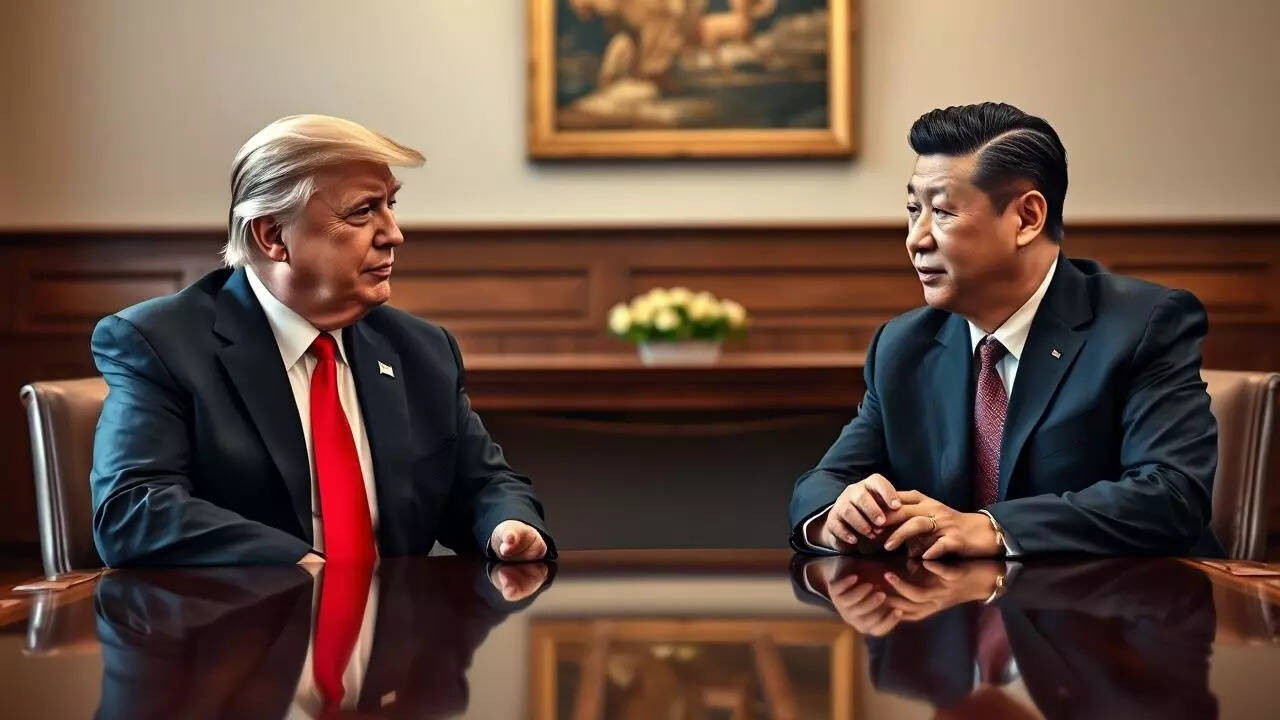Asian markets rallied Friday, buoyed by the upcoming Trump-Xi meeting, easing trade war fears. Japan’s Nikkei surged on tech gains and inflation data, while South Korea’s Kospi hit a record. Wall Street also climbed, driven by oil price spikes following US sanctions on Russia and strong corporate earnings. Gold prices dipped slightly.
A Sigh of Relief? Asian Markets React to Trump-Xi Meeting
For weeks, a tense silence had hung over global markets, thick with the potential for escalating trade wars between the world’s two largest economies. Then came the news: a face-to-face meeting between former US President Donald Trump and Chinese President Xi Jinping had been confirmed. And almost immediately, a wave of optimism washed over Asian stock markets, leaving traders breathing a collective sigh of relief.
The confirmation acted as a starting gun, sending indices across the region into a sprint. From Tokyo to Hong Kong, Seoul to Singapore, the green shoots of recovery were visible. Investors, weary of the uncertainty, seized the opportunity to inject some much-needed confidence back into the system. What exactly fueled this rapid turnaround? Let’s take a closer look.
Deciphering the Market’s Optimism
It’s not just the meeting itself that spurred this positive reaction; it’s the expectation that it will lead to a de-escalation of trade tensions. For months, tit-for-tat tariffs and political rhetoric had created an environment of instability, making it difficult for businesses to plan and invest. A sit-down between the two leaders suggests a willingness to find common ground, to negotiate and potentially roll back some of the more damaging measures.
Think of it like a pressure valve releasing steam. The anticipation of dialogue, of a potential pathway to resolution, is often enough to calm jittery nerves. The key word here is “potential.” The markets are betting that this meeting represents a genuine effort to ease tensions, not just a photo opportunity.
Asian Stock Markets See a Respite Amidst Trade War Fears
Hong Kong’s Hang Seng Index, often a barometer of Chinese economic sentiment, saw a significant jump. Similarly, Japan’s Nikkei 225 experienced a surge, reflecting the interconnectedness of Asian economies and their vulnerability to fluctuations in global trade. South Korean and Singaporean markets also responded positively, suggesting a broad regional expectation for a more stable economic environment.

This isn’t just about numbers on a screen. These market movements have real-world implications. They influence investment decisions, business confidence, and ultimately, economic growth. A positive market reaction can lead to increased investment, job creation, and a more stable financial outlook for businesses and individuals across the region.
The Long Road Ahead: Sustainable Relief or a Temporary Bounce?
While the initial market response is undoubtedly encouraging, it’s crucial to maintain a sense of perspective. One meeting, however promising, does not guarantee a complete resolution of all trade disputes. The underlying issues – intellectual property theft, market access, and unfair trade practices – are complex and deeply rooted.
The true test will come in the weeks and months following the meeting. Will both sides be willing to compromise and negotiate in good faith? Will concrete progress be made towards addressing the fundamental issues? Or will this be merely a temporary respite before tensions flare up again?
The answers to these questions will determine whether the current market rally is sustainable or just a fleeting moment of optimism. Investors will be closely watching for any signals that indicate the direction of the US-China relationship. Policy changes, official statements, and trade data will all be scrutinized for clues about the future.
It’s also worth considering the potential impact on specific sectors. Companies heavily reliant on exports between the US and China, such as technology and manufacturing firms, stand to benefit the most from a trade thaw. Conversely, those involved in industries targeted by tariffs may remain cautious, even with the prospect of eased tensions.
For example, consider the impact of ongoing geopolitical issues on sectors like semiconductors. We delve into this in our piece on [future semiconductor market trends](internal-link).
A Cautiously Optimistic Outlook for Asian Markets
The confirmation of the Trump-Xi meeting provided a much-needed boost to Asian stock markets, reflecting the region’s sensitivity to US-China trade relations. The expectation of eased tensions has fueled a surge in investor confidence. While challenges remain and a long-term resolution is not guaranteed, this initial response signals a cautiously optimistic outlook. The coming months will be critical in determining whether this optimism is justified and whether lasting stability can be achieved in the global economic landscape. The world will be watching.







